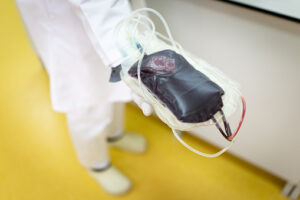The World Health Organization (WHO) currently recommends that blood centers separate blood donations into components to maximize the number of transfusions. However, packed red blood cells (pRBC) are more time-consuming and costly to prepare compared to whole blood, so most transfusions in sub-Saharan Africa utilize whole blood. A secondary analysis of the Transfusion and Treatment of African Children (TRACT) trial recently published in The Lancet questions WHO recommendations on the use of pRBC in African children with severe anemia. During the study from 2014 to 2017, 3992 transfusions were initiated in 3188 children with severe anemia (64% positive for malaria; median age 37 months; 42% had a hemoglobin < 4 g/dL) in Uganda and Malawi. Of 3992 transfusions in 3188 children, whole blood was used in 41% (1632/3992) of the transfusions, and pRBC for 59% (2360/3992) of the transfusions. Recovery hemoglobin levels at 8 hours after transfusion were significantly higher in children who received whole blood compared to red cell concentrates (P<0.0001). Furthermore, children who initially received pRBC had significantly higher odds of receiving a second transfusion (P<0.0001) and longer hospital stays (P<0.0024). A clinical trial comparing the use of whole blood and pRBC in severely anemic children is needed.
Reference:

